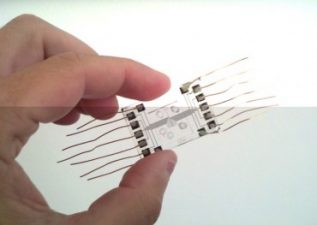 Umbrella sales in the UAE may soon see a surge in pricing. Researchers at the Masdar Institute have filed for a provisional patent with the United States Patent and Trademark Office for their discovery – and innovative cloud seeding material that moves them closer to their goal of producing rain on demand. It appears to be a more practical approach than building artificial mountains.
Umbrella sales in the UAE may soon see a surge in pricing. Researchers at the Masdar Institute have filed for a provisional patent with the United States Patent and Trademark Office for their discovery – and innovative cloud seeding material that moves them closer to their goal of producing rain on demand. It appears to be a more practical approach than building artificial mountains.
Dr. Linda Zou is leading the project. A professor of chemical and environmental engineering, she is one of the first scientists to explore nanotechnology to enhance a cloud seeding material’s ability to produce rain. By filing a patent, the team is paving a way to commercialize their discovery, and aligning with Masdar Institute’s aim to position the UAE as a world leader in science and tech, specifically in the realm of environmental sustainability.
It is a significant step towards achieving greater water security in the UAE. Rainfall enhancement via cloud seeding can potentially increase precipitation by 10% to 30%, helping to refresh groundwater reserves, boost agricultural production, and reduce the country’s heavy reliance on water produced by energy-intensive seawater desalination.
“Using nanotechnology to accelerate water droplet formation on a typical cloud seeding material has never been researched before. It is a new approach that could revolutionize the development of cloud seeding materials and make them significantly more efficient and effective,” said Dr. Zou.
Rain enhancement leverages cloud physics, atmosphere physics, and topographical studies to stimulate clouds to produce rain. Zou and her team complement such work through their focus on the cloud seeding material itself.
Conventional cloud seeding materials are tiny particles such as salt crystals, dry ice and silver iodide. A few microns (one-thousandth of a millimeter) in size, these act as the core around which cloud water condenses, stimulating water droplet growth. Once the air in the cloud reaches a certain level of saturation, it can no longer hold in that moisture, and rain falls. Cloud seeding essentially mimics what naturally occurs in clouds, but enhances the process by adding particles that can stimulate and accelerate the condensation process.
 According to a Masdar Institute press release, Dr. Zou (pictured above, left) and her collaborators, Dr. Mustapha Jouiad, Principal Research Scientist in Mechanical and Materials Engineering Department, postdoctoral researcher Dr. Nabil El Hadri and PhD student Haoran Liang, explored ways to improve the process of condensation on a pure salt crystal by layering it with a thin coating of titanium dioxide.
According to a Masdar Institute press release, Dr. Zou (pictured above, left) and her collaborators, Dr. Mustapha Jouiad, Principal Research Scientist in Mechanical and Materials Engineering Department, postdoctoral researcher Dr. Nabil El Hadri and PhD student Haoran Liang, explored ways to improve the process of condensation on a pure salt crystal by layering it with a thin coating of titanium dioxide.
The coating measures around 50 nanometers, more than one thousand times thinner than a human hair. Miniscule in size, the coating has a massive effect on the salt’s condensation efficiency. Titanium dioxide is a hydrophilic photocatalyst, which means that when in contact with water vapor in the cloud, it helps to initiate and sustain the water vapor condensation on the nanoparticle’s surface, accelerating formation of large water droplets – hence, rain.
Zou’s team found that their coating improved salt’s ability to absorb and condense water vapor by a hyndredfold compared to an uncoated salt crystal. Armed with the materials to increase in condensation efficiency, research will now move on to field testing.
The team was one of the inaugural recipients of a US$5 MIL grant from the UAE Research Program for Rain Enhancement Science last year, a program established to increase rain enhancement research in the UAE and arid and semi-arid regions across the world. That grant will fund another two years of research.
Awardees of the Program’s Second Cycle grant of US$ 5 million were announced Abu Dhabi Sustainability Week 2017, and include teams from the University of Reading (UK), the Finnish Meteorological Institute, and the American firm Spec Inc.




4 thoughts on “Masdar nanotech promises to bring on the rain!”
Comments are closed.